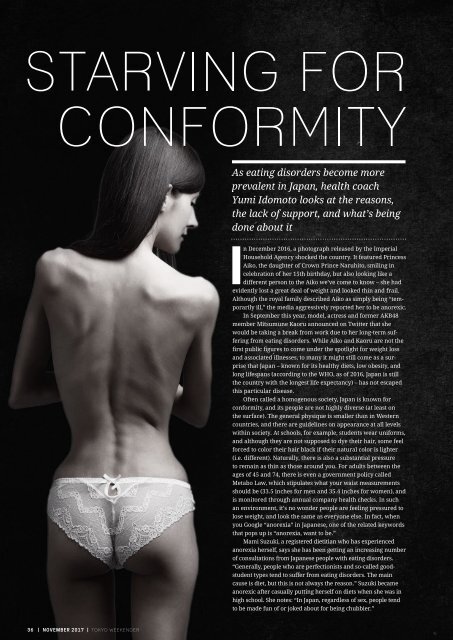Tokyo Weekender - November 2017
Our November issue is out, featuring a jam-packed end-of-year special: 42 Christmas gift shopping ideas and 10 bonenkai spots. Plus: The avant-garde world of butoh dance, Japanese teen prodigies, and a special supplement guide to Akita. Here's where to find a copy around Tokyo: www.tokyoweekender.com/pickup/
Our November issue is out, featuring a jam-packed end-of-year special: 42 Christmas gift shopping ideas and 10 bonenkai spots. Plus: The avant-garde world of butoh dance, Japanese teen prodigies, and a special supplement guide to Akita. Here's where to find a copy around Tokyo: www.tokyoweekender.com/pickup/
You also want an ePaper? Increase the reach of your titles
YUMPU automatically turns print PDFs into web optimized ePapers that Google loves.
As eating disorders become more<br />
prevalent in Japan, health coach<br />
Yumi Idomoto looks at the reasons,<br />
the lack of support, and what’s being<br />
done about it<br />
In December 2016, a photograph released by the Imperial<br />
Household Agency shocked the country. It featured Princess<br />
Aiko, the daughter of Crown Prince Naruhito, smiling in<br />
celebration of her 15th birthday, but also looking like a<br />
different person to the Aiko we’ve come to know – she had<br />
evidently lost a great deal of weight and looked thin and frail.<br />
Although the royal family described Aiko as simply being “temporarily<br />
ill,” the media aggressively reported her to be anorexic.<br />
In September this year, model, actress and former AKB48<br />
member Mitsumune Kaoru announced on Twitter that she<br />
would be taking a break from work due to her long-term suffering<br />
from eating disorders. While Aiko and Kaoru are not the<br />
first public figures to come under the spotlight for weight loss<br />
and associated illnesses, to many it might still come as a surprise<br />
that Japan – known for its healthy diets, low obesity, and<br />
long lifespans (according to the WHO, as of 2016, Japan is still<br />
the country with the longest life expectancy) – has not escaped<br />
this particular disease.<br />
Often called a homogenous society, Japan is known for<br />
conformity, and its people are not highly diverse (at least on<br />
the surface). The general physique is smaller than in Western<br />
countries, and there are guidelines on appearance at all levels<br />
within society. At schools, for example, students wear uniforms,<br />
and although they are not supposed to dye their hair, some feel<br />
forced to color their hair black if their natural color is lighter<br />
(i.e. different). Naturally, there is also a substantial pressure<br />
to remain as thin as those around you. For adults between the<br />
ages of 45 and 74, there is even a government policy called<br />
Metabo Law, which stipulates what your waist measurements<br />
should be (33.5 inches for men and 35.4 inches for women), and<br />
is monitored through annual company health checks. In such<br />
an environment, it’s no wonder people are feeling pressured to<br />
lose weight, and look the same as everyone else. In fact, when<br />
you Google “anorexia” in Japanese, one of the related keywords<br />
that pops up is “anorexia, want to be.”<br />
Mami Suzuki, a registered dietitian who has experienced<br />
anorexia herself, says she has been getting an increasing number<br />
of consultations from Japanese people with eating disorders.<br />
“Generally, people who are perfectionists and so-called goodstudent<br />
types tend to suffer from eating disorders. The main<br />
cause is diet, but this is not always the reason.” Suzuki became<br />
anorexic after casually putting herself on diets when she was in<br />
high school. She notes: “In Japan, regardless of sex, people tend<br />
to be made fun of or joked about for being chubbier.”<br />
36 | NOVEMBER <strong>2017</strong> | TOKYO WEEKENDER
















